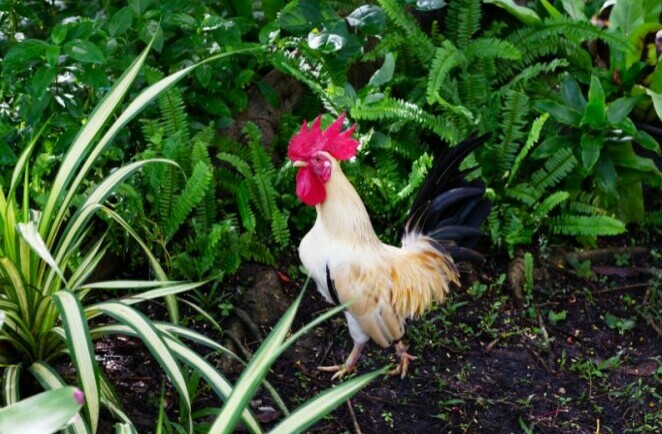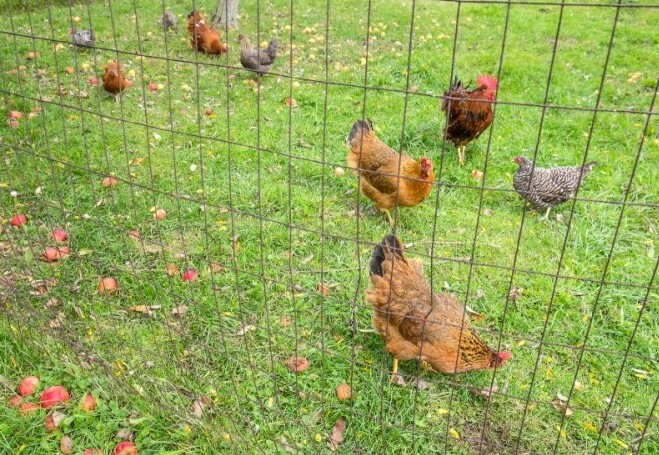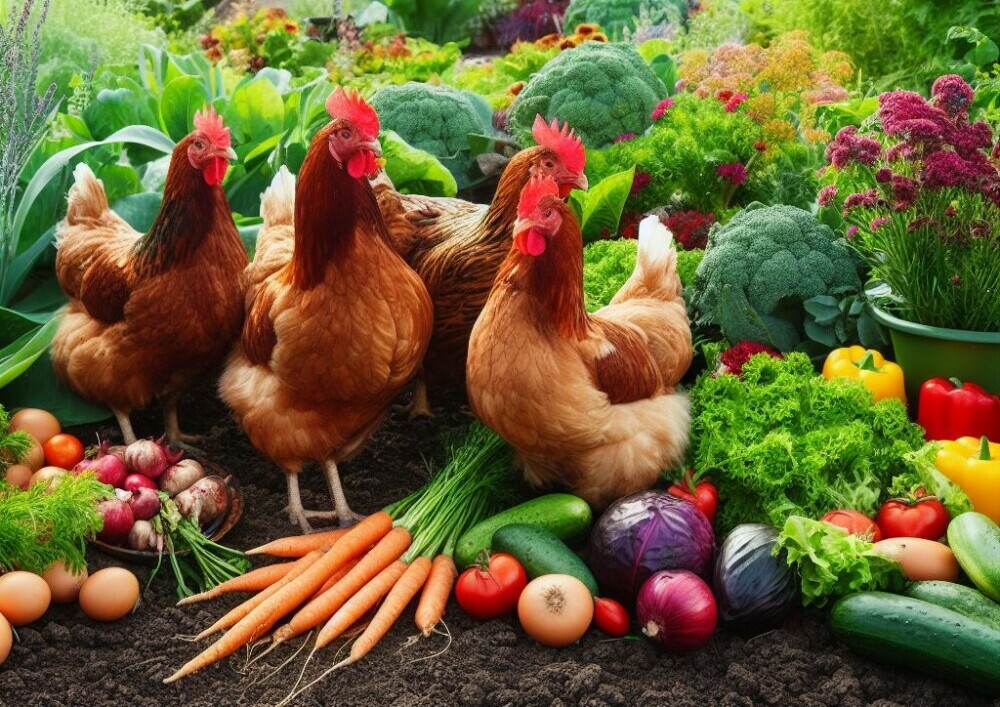
Hey folks! If you will, picture a lush garden brimming with ripe tomatoes, crisp cucumbers, and a riot of colorful flowers, all buzzing with life. Now, add a flock of chickens to the mix.
They’re not just good at egg-laying; they can also be gardeners’ little helpers. But before you throw open the gates to Chicken Eden, let’s talk turkey (or chicken, in this case).
Chickens in the garden can be like toddlers in a toy shop — everything is up for grabs, and chaos can ensue if not supervised.
They scratch, they peck, and they can turn your veggie patch into a salad bar gone wild. But with a little know-how and some clever management, your chickens can mingle with your marigolds without turning your garden into a feathery fiasco.
This article will explore the dos and don’ts of letting your chickens play part-time gardener.
We’ll figure out how to let them till the soil and hunt pests while keeping your greens and blooms safe from their eager beaks.
So, grab your garden gloves and a cup of something nice, and let’s dig into chickens and gardens — a match made in heaven with just a bit of earthly wisdom.
Why Do Chickens Love Gardens: Exploring The Symbiotic Relationship

Chickens and gardens share an age-old bond that’s as natural as the pecking order within a flock. This relationship is not just a coincidence; it’s a symbiotic dance that benefits both parties.
But just as the pecking order drama benefits the flock as a whole, controlling the relationship between the chicken and the garden does the same.
Anyone with chickens knows they will obliterate a freshly planted garden, uncovering seeds with their constant scratching, pecking, and devouring seeds and seedlings alike.
I had a small bank of cherry tomatoes that I was looking forward to using myself. However, they disappeared in a matter of minutes when my pullets found them. I thought they were out of reach.
Did you know that chickens can hop?
So, shouldn’t chickens be kept away from the garden? Yes and no. They can’t be allowed to destroy your garden, but they should be controlled in a way that makes the relationship work.
It is no wonder that chickens find gardens irresistible.
Gardens are a treasure trove of insects, worms, and fresh greens, which are staples in a chicken’s diet.
Moreover, as chickens scratch and peck at the ground, they aerate the soil, which is beneficial for the garden under certain circumstances.
Discouraging Chickens from Frequenting Your Garden

I built this garden in about a week. It’s ten feet by twenty feet by eleven inches deep and completely surrounded by a six-foot-tall dog kennel and five-foot chickenwire. I fashioned a little room in the back right side for tools and to hold my harvest without the chickens bothering it. A human door in one of the room sections allows easy entry for me.
Later on, I’ll show you my bounty when I update this post!
You might wonder why it took me a week to build this garden. First, I’m recovering from a long battle with a herniated L4 spinal disk, so I had to move the dirt a little at a time. Secondly, I had a lot of “help”.

Haha, these ladies ate so many worms during the excavation that they would lay around like little sea lions after they had their fill.
While chickens can be great for gardens, they can also pose a challenge for gardeners who are trying to protect their tender plants. As I mentioned, chickens can quickly decimate a garden bed with their scratching and pecking. It’s enough to make you second-guess raising chickens.
To keep chickens at bay, consider humane deterrents like motion-activated sprinklers or creating a designated dust bath area to lure them away from plants.
It’s also effective to plant robust, chicken-resistant plants around the perimeter of your garden.
But by far, the best chicken deterrent for your garden area is fencing.
Here is a very clever idea for creating a bug-free zone around your garden using double fencing.
This is done by putting up a fence around the garden and another fence around the first fence but a few feet away. The chickens can be allowed in this “moat” as long as you like so they can forage for hostile bugs that might want to enter your garden.
Did you know that a chicken will eat as many bugs as possible? That’s right, and that can be a hundred a day per chicken!
Flying pollinators will not likely be harmed in this scenario.

The Ideal Timing: When to Permit Your Chickens into the Garden
There are times when you will want to let chickens into your garden.
And timing is everything when it comes to letting this happen. Once the harvest is done, or when plants are mature enough not to be destroyed by a little pecking, that’s the perfect time to let your flock in.
Just before the roosting time is a good time to let the chickens in to clean up unwanted bugs and other pests.
They’ll also help clean up the remnants of the season’s plants.
The seasons also play a role; for instance, during the early spring, chickens can help turn the soil and remove pests without the risk of damaging young plants that aren’t yet in the ground.
A Health Alert: The Risks of Chicken Waste-Related Diseases on Vegetables
Chicken waste is rich in nitrogen, which is excellent for composting but can be harmful if it comes into direct contact with vegetables due to the risk of salmonella and E. coli.
It’s crucial to manage where chickens defecate and ensure that any waste is properly composted before being used as fertilizer.
Safe handling includes wearing gloves when dealing with chicken waste and thoroughly washing any produce from the garden.
Co-existing in Harmony: Raising Chickens and Growing Vegetables Simultaneously

Despite the challenges, raising chickens and growing vegetables together in a mutually beneficial system is possible.
By establishing designated areas for chickens and plants, using chicken tractors, and understanding the needs of both, gardeners and chickens can enjoy the fruits (and vegetables) of their labor.
A chicken tractor is essentially a mobile chicken coop that lacks a floor and is often equipped with wheels.
It’s designed to be moved around your yard or field.
In the “tractor,” the chickens work tilling the ground, eating pests, and fertilizing the soil, much like a tractor in traditional farming but in a more natural and eco-friendly way.
Chicken tractors can come in various designs, from simple A-frames to more elaborate structures, depending on your needs and the size of your flock. You can look at a chicken tractor here if you want.
They’re a great tool for those who want to maintain a healthy, productive flock while also taking good care of their land.
Using the abovementioned techniques, there is no reason your chickens can’t enjoy your garden as much as you do.
Success stories abound of gardeners who’ve found the perfect balance, resulting in healthier plants, happier chickens, and a more sustainable way of living.
By following their best practices, you, too, can create a thriving garden that caters to the needs of your backyard flock.
Take care, folks.
Dave

Chickenmethod.com
